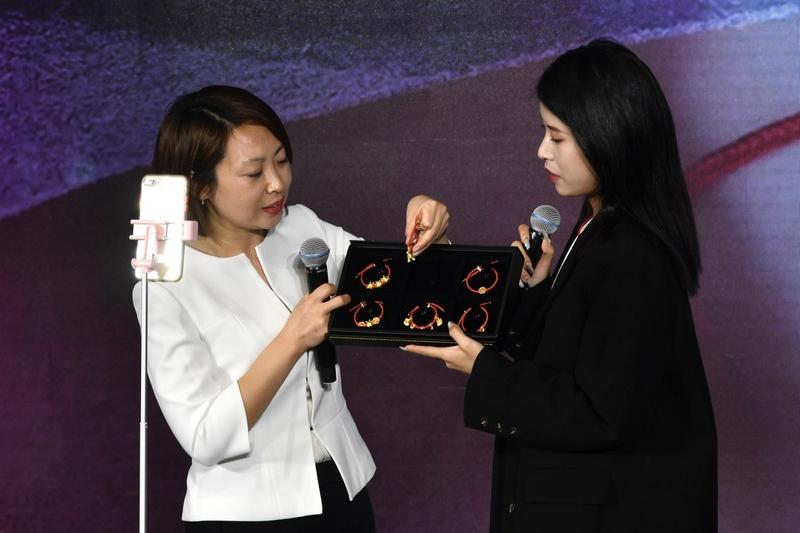 A livestreaming broadcaster, right, and an employee of Caibai Jewelry introduce products through a livestreaming session in Beijing this month. (WU NING / FOR CHINA DAILY)
A livestreaming broadcaster, right, and an employee of Caibai Jewelry introduce products through a livestreaming session in Beijing this month. (WU NING / FOR CHINA DAILY)
Liu Jingjun, 50, a restaurant owner in Zibo, Shandong province, recently learned how to shop online and snag a barrage of discounts during the first post-pandemic Singles Day shopping extravaganza.
"I logged in on midnight to grab bargains for a whole set of gold jewelry, including necklaces, bracelets and rings, for my future daughter-in-law on Chow Tai Fook's flagship store on Tmall. It is a tradition that a son's parents give their daughter-in-law good jewelry for good wishes. The whole set costs me about 50,000 yuan (US$7,600), which was 5,000 yuan cheaper than the brand's local store," Liu said.
Liu said his family's catering business was severely impacted by the COVID-19 pandemic and they wanted to save up as much as possible, even for his son's wedding next year. Liu said many wedding supplies, especially gold jewelry, were purchased online where offers were much more generous.
"I used to laugh at my son and nephews seeing them stay up late snagging discounts. Now, I have become one of them. I still don't understand the discount rules and my son helped get me virtual coupons," he said.
The report predicts that transactions of products across all categories through livestreaming e-commerce will increase 156 percent year-on-year to nearly 1.16 trillion yuan in 2020, and the booming livestreaming e-commerce segment will contribute new growth points to China's gold and jewelry industry
ALSO READ: At home, online workouts taking off with livestreaming
Most gold shoppers still insist on visiting stores and seeing products up close and personal even though a large amount of product categories have gone online in recent years. However, the COVID-19 outbreak has driven more and more gold consumers online, and the e-commerce livestreaming boom this year helped entice price-sensitive buyers.
According to a report by industry analysis website chinabaogao.com, gold sales through online channels are expected to make up 21.4 percent of total gold sales this year, up from 7.7 percent in 2019.
The report predicts that transactions of products across all categories through livestreaming e-commerce will increase 156 percent year-on-year to nearly 1.16 trillion yuan in 2020, and the booming livestreaming e-commerce segment will contribute new growth points to China's gold and jewelry industry.
A recent report by the World Gold Council said that although online sales for gold are developing rapidly, there is still a large gap between e-commerce sales for gold and other luxury goods. The report said gold retailers should actively embrace the digital wave and offer more personalized services for both online and offline gold sales.
Shenzhen, Guangdong province-based gold jewelry retailer Chow Tai Seng's revenue from e-commerce sales rose 159.95 percent year-on-year to 315 million yuan in the third quarter, while revenue from offline sales dropped 18.37 percent year-on-year to 178 million yuan.
Chow Tai Seng said it has paid more attention to the development of e-commerce since the COVID-19 outbreak, and has seen rapid growth of its online sector. Chow Tai Fook Jewelry Group Ltd, based in Hong Kong, reported a 30.2 percent year-on-year growth of retail sales value for its e-commerce and online-to-offline sectors, which accounted for 5.4 percent of total retail sales value in the Chinese mainland from July to September.
"Many of our member companies are actively seeking ways to promote online sales, especially during the COVID-19 outbreak and in the post-pandemic era," said Wang Lixin, managing director of WGC's China branch.
"For gold retailers that are already well-known to consumers in China, developing online sectors and livestreaming e-commerce is no doubt a great way to boost revenue. However, it is more challenging for small and medium-sized companies, and gold jewelry processors and manufacturers, as they usually make transactions with companies and are less known to consumers," Wang said.
READ MORE: Stronger management urged over livestreaming platforms
"As the COVID-19 pandemic dealt a blow to the gold industry, those companies are also eyeing online channels and e-commerce livestreaming to seek new revenue growth points," Wang added.
Zibo-based restaurant owner Liu is among those who only trust top brands. "Buying gold is nothing like buying a soap or towel. Gold costs a lot and I fear spending such a big amount of money on something fake, or less pure, or brands that lack after-sales service. It's much easier to just go for brands that I am familiar with," Liu said.
Wang said such situations happened both in online and offline purchasing scenarios, but market regulations for online sales still need improvement.
"An enhanced market regulatory system for gold transactions through e-commerce platforms will be a great comfort for consumers and benefit the gold industry in the long run," Wang said.


